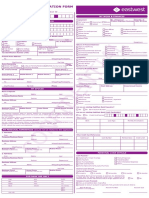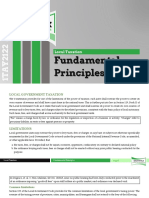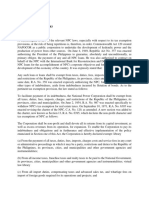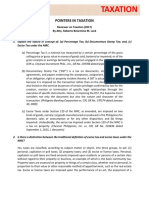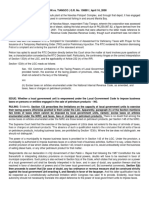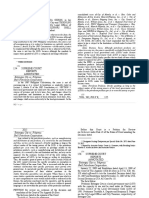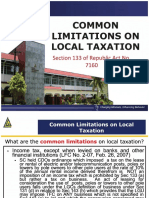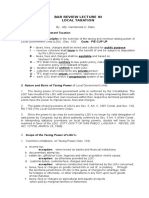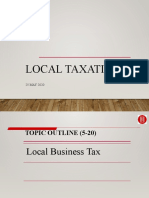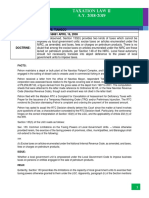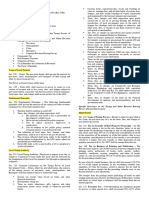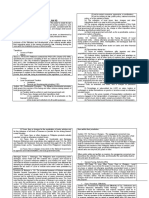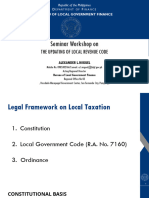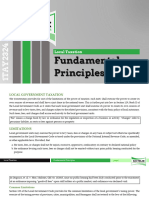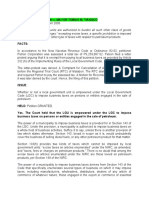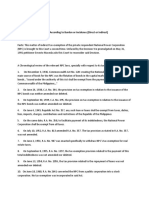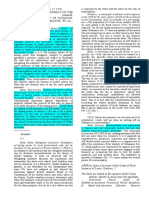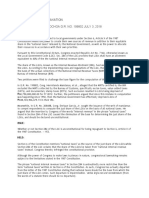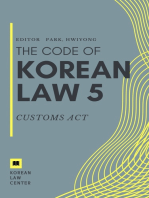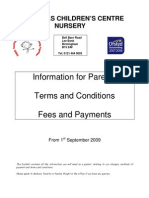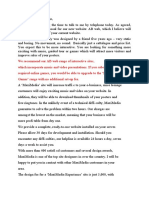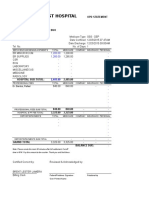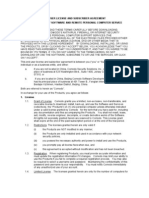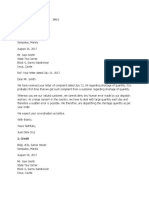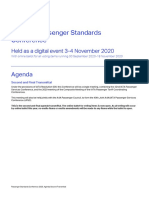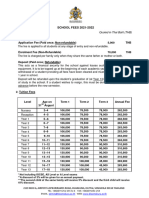Common Limitations On Local Government Unit (Tax)
Common Limitations On Local Government Unit (Tax)
Uploaded by
Stephen Michael Ben CañeteCopyright:
Available Formats
Common Limitations On Local Government Unit (Tax)
Common Limitations On Local Government Unit (Tax)
Uploaded by
Stephen Michael Ben CañeteOriginal Description:
Original Title
Copyright
Available Formats
Share this document
Did you find this document useful?
Is this content inappropriate?
Copyright:
Available Formats
Common Limitations On Local Government Unit (Tax)
Common Limitations On Local Government Unit (Tax)
Uploaded by
Stephen Michael Ben CañeteCopyright:
Available Formats
Common Limitations on Local Government transactions on goods or services
Unit except as otherwise provided herein;
Section 133. Common Limitations on the (j) Taxes on the gross receipts of
Taxing Powers of Local Government Units. - transportation contractors and persons
Unless otherwise provided herein, the exercise engaged in the transportation of
of the taxing powers of provinces, cities, passengers or freight by hire and
municipalities, and barangays shall not extend to common carriers by air, land or water,
the levy of the following: except as provided in this Code;
(a) Income tax, except when levied on (k) Taxes on premiums paid by way or
banks and other financial institutions; reinsurance or retrocession;
(b) Documentary stamp tax; (l) Taxes, fees or charges for the
registration of motor vehicles and for the
(c) Taxes on estates, inheritance, gifts, issuance of all kinds of licenses or
legacies and other acquisitions mortis permits for the driving thereof, except
causa, except as otherwise provided tricycles;
herein;
(m) Taxes, fees, or other charges on
(d) Customs duties, registration fees of Philippine products actually exported,
vessel and wharfage on wharves, except as otherwise provided herein;
tonnage dues, and all other kinds of
customs fees, charges and dues except (n) Taxes, fees, or charges, on
wharfage on wharves constructed and Countryside and Barangay Business
maintained by the local government unit Enterprises and cooperatives duly
concerned; registered under R.A. No. 6810 and
Republic Act Numbered Sixty-nine
(e) Taxes, fees, and charges and other hundred thirty-eight (R.A. No. 6938)
impositions upon goods carried into or otherwise known as the "Cooperative
out of, or passing through, the territorial Code of the Philippines" respectively;
jurisdictions of local government units in and
the guise of charges for wharfage, tolls
for bridges or otherwise, or other taxes, (o) Taxes, fees or charges of any kind
fees, or charges in any form whatsoever on the National Government, its
upon such goods or merchandise; agencies and instrumentalities, and local
government units.
(f) Taxes, fees or charges on agricultural
and aquatic products when sold by Petron Corp vs Tiangco GR No. 158881
marginal farmers or fishermen;
(g) Taxes on business enterprises Facts:
certified to by the Board of Investments
as pioneer or non-pioneer for a period of Petron maintains a depot or bulk plant at
six (6) and four (4) years, respectively the Navotas Fishport Complex in
from the date of registration; Navotas. Through that depot, it has
engaged in the selling of diesel fuels to
(h) Excise taxes on articles enumerated vessels used in commercial fishing in
under the national Internal Revenue and around Manila Bay. On 1 March
Code, as amended, and taxes, fees or 2002, Petron received a letter from the
charges on petroleum products; office of Navotas Mayor, respondent
Toby Tiangco, wherein the corporation
(i) Percentage or value-added tax (VAT) was assessed taxes "relative to the
on sales, barters or exchanges or similar
figures covering sale of diesel declared Navotas bulk plant or otherwise
by your Navotas Terminal from 1997 to interfering in its operations.
2001." The stated total amount due
was P6,259,087.62, a figure derived Issue: Whether or not the clause taxes, fees or
from the gross sales of the depot during charges on petroleum products" in Section
the years in question. The computation 133(h) precludes local government units from
sheets that were attached to the letter imposing business taxes based on the sale of
made reference to Ordinance 92-03, or petroleum products.?
the New Navotas Revenue Code
(Navotas Revenue Code), though such
enactment was not cited in the letter Held: Yes. As earlier observed, Section 133(h)
itself. provides two kinds of taxes which cannot be
Petron duly filed with Navotas a letter- imposed by local government units: "excise
protest to the notice of assessment taxes on articles enumerated" under the NIRC,
pursuant to Section 195 of the Code. It as amended; and "taxes, fees or charges on
argued that it was exempt from local petroleum products." There is no doubt that
business taxes in view of Art. 232(h) of among the excise taxes on articles enumerated
the Implementing Rules (IRR) of the under the NIRC are those levied on petroleum
Code, as well as a ruling of the Bureau products, per Section 148 of the NIRC.
of Local Government Finance of the
Congress has the constitutional authority to
Department of Finance dated 31 July
impose limitations on the power to tax of local
1995, the latter stating that sales of
government units, and Section 133 of the Code
petroleum fuels are not subject to local
is one such limitation. Indeed, the provision is
taxation. The letter-protest was denied
the explicit statutory impediment to the
by the Navotas Municipal Treasurer
enjoyment of absolute taxing power by local
Petron filed with the Malabon RTC a
government units, not to mention the reality that
Complaint for Cancellation of
such power is a delegated power. To cite one
Assessment for Deficiency Taxes with
example, under Section 133(g), local
Prayer for the Issuance of a Temporary
government units are disallowed from levying
Restraining Order (TRO) and/or
business taxes on "business enterprises certified
Preliminary Injunction. The quested
to by the Board of Investments as pioneer or
TRO was not issued by the Malabon
non-pioneer for a period of six (6) and (4) four
RTC upon manifestation of respondents
years, respectively from the date of registration."
that they would not proceed with the
closure of Petron’s Navotas bulk plant Section 133(h) states that local government
until after the RTC shall have decided units "shall not extend to the levy of xxx taxes,
the case on the merits. fees or charges on petroleum products."
The Malabon RTC rendered its Respondents assert that the phrase "taxes, fees
Decision dismissing Petron’s complaint or charges on petroleum products" pertains to
and ordering the payment of the the imposition of direct or excise taxes on
assessed amount. Eleven days later, petroleum products, and not business taxes. If
Petron received a Closure Order from the phrase actually pertains to excise taxes, then
the Mayor, directing Petron to cease and it would be an exercise in utter redundancy,
desist from operating the bulk plant. since the preceding phrase already prohibits the
Petron sought a TRO from the Malabon imposition of excise taxes on articles already
RTC, but this was denied. Petron also subject to such taxes under the NIRC, such as
filed a motion for reconsideration of the petroleum products. There would be no sense
order of denial, but this was likewise on the part of the legislature to twice emphasize
denied. in the same sentence that excise taxes on
This Court issued a TRO, enjoining the petroleum products are beyond the pale of local
respondents from closing Petron’s government taxation.
The language of Section 133(h) makes plain that In 2002, respondent was only paying the
the prohibition with respect to petroleum amount of ₱98,964.71 for fees and other
products extends not only to excise taxes charges which include the amount of
thereon, but all "taxes, fees and charges." The ₱1,180.34 as Mayor’s Permit. However,
earlier reference in paragraph (h) to excise taxes on February 20, 2001, petitioner
comprehends a wider range of subjects of Batangas City, through its City Legal
taxation: all articles already covered by excise Officer, sent a notice of assessment to
respondent demanding the payment of
taxation under the NIRC, such as alcohol
₱92,373,720.50 and ₱312,656,253.04
products, tobacco products, mineral products,
as business taxes for its manufacture
automobiles, and such non-essential goods as and distribution of petroleum products.
jewelry, goods made of precious metals, In addition, respondent was also
perfumes, and yachts and other vessels required and assessed to pay the
intended for pleasure or sports. In contrast, the amount of ₱4,299,851.00 as Mayor’s
later reference to "taxes, fees and charges" Permit Fee based on the gross sales of
pertains only to one class of articles of the many its Tabagao Refinery. The assessment
subjects of excise taxes, specifically, "petroleum was allegedly pursuant of Section 134 of
products". While local government units are the LGC of 1991 and Section 23 of its
authorized to burden all such other class of Batangas City Tax Code of 2002.
goods with "taxes, fees and charges," excepting
excise taxes, a specific prohibition is imposed Respondent filed a protest on April 17,
barring the levying of any other type of taxes 2002 contending among others that it is
with respect to petroleum products. not liable for the payment of the local
business tax either as a manufacturer or
While Section 133(h) does not generally bar distributor of petroleum products. It
the imposition of business taxes on articles further argued that the Mayor’s Permit
burdened by excise taxes under the NIRC, it Fees are exorbitant, confiscatory,
specifically prohibits local government units arbitrary, unreasonable and not
from extending the levy of any kind of "taxes, commensurable with the cost of issuing
a license.
fees or charges on petroleum products."
Accordingly, the subject tax assessment
is ultra vires and void. Petitioners denied respondent’s protest
and declared that under Section 14 of
the Batangas City Tax Code of 2002,
they are empowered to withhold the
Batangas City vs Pilipinas Shell Petroleum issuance of the Mayor’s Permit for
Corporation GR No. 187631 failure of respondent to pay the business
taxes on its manufacture and distribution
Facts: of petroleum products. Respondent filed
a Petition for Review pursuant to
Petitioner Batangas City is a local government Section 195 of the LGC of 1991 before
unit (LGU) with the capacity to sue and be sued the Regional Trial Court (RTC) of
under its Charter and Section 22(a)(2) of the Batangas City.1âwphi1
Local Government Code (LGC) of 1991.
Petitioners Teodulfo A. Deguito and Benjamin E. In its petition, respondent maintained
Pargas are the CityLegal Officer and City that petitioners have no authority to
Treasurer, respectively, of Batangas City. impose the said taxes and fees, and
argued that the levy of local business
Respondent Pilipinas Shell Petroleum taxes on the business of manufacturing
Corporation operates an oil refinery and depot in and distributing gasoline and other
Tabagao, Batangas City, which manufactures petroleum products is contrary to law
and produces petroleum products that are and against national policy. It further
distributed nationwide. contended that the Mayor’s Permit Fee
levied by petitioners were unreasonable
and confiscatory.
In its Answer, petitioners contended that guidelines and limitations that Congress may
the City of Batangas can legally impose provide
taxes on the business of manufacturing
and distribution of petroleum products, Section 133 provides for the common
including the Mayor’s Permit Fees upon limitations on the taxing powers of LGUs.
respondent.
Among the common limitations on the taxing
The RTC of Batangas City rendered a powers of LGUs under Section 133 of the
Decision sustaining the imposition of LGC is paragraph (h)
business taxes by petitioners upon the
manufacture and distribution of Section 133(h) clearly specifies the two kinds
petroleum products by respondent. of taxes which cannot be imposed by LGUs:
(1) excise taxes on articles enumerated
CTA Second Division granted under the NIRC, as amended; and (2) taxes,
respondent’s petition. It held that fees or charges on petroleum products.
respondent is not subject to the
business taxes on the manufacture and Indisputably, the power of LGUs to impose
distribution of petroleum products business taxes derives from Section 143 of
because of the express limitation the LGC. However, the same is subject to the
provided under Section 133(h) of the
explicit statutory impediment provided for
LGC
under Section 133(h) of the same Code which
prohibits LGUs from imposing "taxes, fees or
Issue: Whether or not an LGU is empowered
charges on petroleum products." It can,
under the LGC to impose business taxes on
therefore, be deduced that although
persons or entities engaged in the business of
manufacturing and distribution of petroleum petroleum products are subject to excise tax,
products? the same is specifically excluded from the
broad power granted to LGUs under Section
Held: No. At the outset, it must be emphasized 143(h) of the LGC to impose business taxes.
that although the power to tax is inherent in the Section 133(h) of the LGC makes plain that the
State, the same is not true for LGUs because
prohibition with respect to petroleum products
although the mandate to impose taxes granted
to LGUs is categorical and long established in extends not only to excise taxes thereon, but all
the 1987 Philippine Constitution, the same is not "taxes, fees or charges." The earlier reference in
all encompassing as it is subject to limitations as paragraph 143(h) to excise taxes comprehends
explicitly stated in Section 5, Article X of the a wider range of subject of taxation: all articles
1987 Constitution, viz.: already covered by excise taxation under the
NIRC, such as alcohol products, tobacco
SECTION 5. Each local government unit shall products, mineral products, automobiles, and
have the power to create its own sources of such non-essential goods as jewelry, goods
revenues and to levy taxes, fees, and charges made of precious metals, perfumes, and yachts
subject to such guidelines and limitations as the and other vessels intended for pleasure or
Congress may provide, consistent with the basic sports. In contrast, the later reference to "taxes,
policy of local autonomy. Such taxes, fees, and fees and charges" pertains only to one class of
charges shall accrue exclusively to the local articles of the many subjects of excise taxes,
governments. specifically, "petroleum products." While LGUs
are authorized to burden all such other class of
This Court expounded that the LGUs’ power to goods with "taxes, fees and charges," excepting
tax is subject to the limitations set forth under excise taxes, a specific prohibition is imposed
Section 133 of the LGC. Thus: It is already well-
barring the levying of any other type of taxes
settled that although the power to tax is inherent
with respect to petroleum products
in the State, the same is not true for the LGUs to
whom the power must be delegated by
Congress and must be exercised within the
You might also like
- Tuxedo Rental AgreementDocument2 pagesTuxedo Rental Agreementapi-407385526No ratings yet
- East West Bank FormDocument2 pagesEast West Bank FormRonald Tan100% (1)
- Module 05 - Fundamental Principles of Local TaxationDocument25 pagesModule 05 - Fundamental Principles of Local TaxationKyla Shmily GonzagaNo ratings yet
- People vs. Orilla - GR 148939-40, February 13, 2004Document1 pagePeople vs. Orilla - GR 148939-40, February 13, 2004Stephen Michael Ben CañeteNo ratings yet
- Canada Student Visa Guide PDFDocument13 pagesCanada Student Visa Guide PDFbabu kerenliNo ratings yet
- Chapter 9 - Managing Cash FlowDocument14 pagesChapter 9 - Managing Cash FlowMutya Neri CruzNo ratings yet
- Group - 02 - Stickk AssignmentDocument6 pagesGroup - 02 - Stickk AssignmentAmbika AnandNo ratings yet
- Local Business Taxes & Real Property Tax: Atty. Vic C. MamalateoDocument78 pagesLocal Business Taxes & Real Property Tax: Atty. Vic C. Mamalateoiris7curl100% (1)
- 1 DigestedDocument5 pages1 DigestedYvet KatNo ratings yet
- Local Government Taxation PDFDocument16 pagesLocal Government Taxation PDFSani BautisTaNo ratings yet
- Maceda Vs MacaraigDocument4 pagesMaceda Vs MacaraigJovy Balangue MacadaegNo ratings yet
- TAX 2 Full Cases May 7 2021Document61 pagesTAX 2 Full Cases May 7 2021Junpyo ArkinNo ratings yet
- Procter and Gamble Vs Commissioner of CustomsDocument11 pagesProcter and Gamble Vs Commissioner of CustomsJustin HarrisNo ratings yet
- Pointers in Taxation (Atty. Roberto Lock) PDFDocument97 pagesPointers in Taxation (Atty. Roberto Lock) PDFReinald Kurt Villaraza100% (1)
- 140 Petron Vs Mayor TiangcoDocument3 pages140 Petron Vs Mayor TiangcoPiaNo ratings yet
- Petron Corp. V Mayor TiangcoDocument22 pagesPetron Corp. V Mayor TiangcomehNo ratings yet
- Maceda VS Macaraig, GR No 88291, May 31, 1981Document43 pagesMaceda VS Macaraig, GR No 88291, May 31, 1981KidMonkey2299No ratings yet
- Taxation Law Review FinalsDocument6 pagesTaxation Law Review FinalsLean Manuel ParagasNo ratings yet
- Petron V TiangcoDocument1 pagePetron V TiangcoAleli Joyce Bucu100% (1)
- Local Government TaxationDocument28 pagesLocal Government TaxationFunnyPearl Adal GajuneraNo ratings yet
- Maceda Vs MacaraigDocument2 pagesMaceda Vs MacaraigJf Maneja100% (1)
- Local Taxation Part IDocument35 pagesLocal Taxation Part IEmille LlorenteNo ratings yet
- Batangas City v. Pilipinas ShellDocument12 pagesBatangas City v. Pilipinas ShellErl RoseteNo ratings yet
- Tax 2 LT and RPT Selected CasesDocument26 pagesTax 2 LT and RPT Selected CasesHoney Joy MBNo ratings yet
- Batangas City v. Pilipinas ShellDocument7 pagesBatangas City v. Pilipinas Shellevelyn b t.No ratings yet
- SECTIONS 133, 193, 232, and 234 of RA 7160Document5 pagesSECTIONS 133, 193, 232, and 234 of RA 7160JFANo ratings yet
- Day 15 PDFDocument324 pagesDay 15 PDFLGCDD region 10No ratings yet
- LOCAL TAX 2014 - Atty. DabuDocument12 pagesLOCAL TAX 2014 - Atty. DabuEwendel GatdulaNo ratings yet
- Local Taxation UpdatedDocument71 pagesLocal Taxation UpdatedEmille Llorente100% (1)
- Taxation Case Digest 3Document9 pagesTaxation Case Digest 3seentherellaaaNo ratings yet
- Petron Vs TiangcoDocument24 pagesPetron Vs TiangcoJeanne CalalinNo ratings yet
- CD - 76. Petron v. TiangcoDocument2 pagesCD - 76. Petron v. TiangcoCzarina CidNo ratings yet
- Local Taxation Seminar NotesDocument7 pagesLocal Taxation Seminar Notesjamesbenedict.bantiling.21No ratings yet
- Petron v. TiangcoDocument1 pagePetron v. TiangcoArahbells100% (1)
- Municipal Finance Sources of Revenue (Sections 5-7, Art X) : TaxationDocument8 pagesMunicipal Finance Sources of Revenue (Sections 5-7, Art X) : TaxationKobe Lawrence VeneracionNo ratings yet
- H. Taxation Other Inherent To Escape From Taxation CasesDocument36 pagesH. Taxation Other Inherent To Escape From Taxation CasesErwin April MidsapakNo ratings yet
- Exercise of The Municipality's Regulatory Power But As A Revenue Measure-Tax On Occupation or BusinessDocument6 pagesExercise of The Municipality's Regulatory Power But As A Revenue Measure-Tax On Occupation or BusinessJade Palace TribezNo ratings yet
- Presentation Updating LRCDocument44 pagesPresentation Updating LRCbagayanlesliejoyceNo ratings yet
- Petron Vs TiangcoDocument24 pagesPetron Vs TiangcoCarlo UsmanNo ratings yet
- Chevron Phils Vs CIRDocument80 pagesChevron Phils Vs CIRJeanne CalalinNo ratings yet
- Fundamental Principles of Local TaxationDocument25 pagesFundamental Principles of Local TaxationKrizzy PatenioNo ratings yet
- 49 - Petron v. TiangcoDocument3 pages49 - Petron v. TiangcoJanine CastroNo ratings yet
- B. Section 14 of R.A. 9167 Constitutes An Undue Limitation of The Taxing Power of LgusDocument4 pagesB. Section 14 of R.A. 9167 Constitutes An Undue Limitation of The Taxing Power of LgusNika RojasNo ratings yet
- Local and Real Property TaxDocument18 pagesLocal and Real Property TaxNori Lola100% (2)
- Reviewer Finals Loc GovDocument40 pagesReviewer Finals Loc Govjaredmarkg.lagahitNo ratings yet
- Petron vs. TiangcoDocument9 pagesPetron vs. TiangcosdfoisaiofasNo ratings yet
- PAL Vs CIR DigestDocument2 pagesPAL Vs CIR DigestAnonymous bOncqbp8yiNo ratings yet
- 2 Taxrev - Petron Vs TiangcoDocument2 pages2 Taxrev - Petron Vs TiangcoDonna Joyce de BelenNo ratings yet
- Taxation Law Philippine Supreme Court DecisionsDocument106 pagesTaxation Law Philippine Supreme Court DecisionsChil BelgiraNo ratings yet
- Plaintiff-Appellee Vs Vs Defendant-Appellant City Attorney Jose P. Recto, Dionisio M. Lingao & Felix Quijano Hilario C. MasupilDocument4 pagesPlaintiff-Appellee Vs Vs Defendant-Appellant City Attorney Jose P. Recto, Dionisio M. Lingao & Felix Quijano Hilario C. MasupilCamille CruzNo ratings yet
- Taxation 1Document55 pagesTaxation 1Arceli C. VillapandoNo ratings yet
- tAX rEV CASESDocument43 pagestAX rEV CASESKing AlduezaNo ratings yet
- Pepsi Vs Municipality of TanauanDocument7 pagesPepsi Vs Municipality of TanauanKenmar NoganNo ratings yet
- Cases On Local TaxationDocument14 pagesCases On Local Taxationmario navalezNo ratings yet
- Maceda V. Macaraig Summary: The Petition Seeks To Nullify Certain Decisions, Orders, Rulings, and ResolutionsDocument3 pagesMaceda V. Macaraig Summary: The Petition Seeks To Nullify Certain Decisions, Orders, Rulings, and ResolutionsTrixie PeraltaNo ratings yet
- Dungo V LopenaDocument14 pagesDungo V LopenaJonathan DancelNo ratings yet
- Petron v. TiangcoDocument2 pagesPetron v. TiangcoAlmarius CadigalNo ratings yet
- Procter & Gamble V Municipality of JagnaDocument2 pagesProcter & Gamble V Municipality of JagnaJackie Canlas100% (3)
- Tax Rev DigestsDocument12 pagesTax Rev DigestsGayle AbayaNo ratings yet
- Sources of Income of Barangay and Different Issues in BarangayDocument12 pagesSources of Income of Barangay and Different Issues in BarangayLyndon G TimpugNo ratings yet
- First Phil V CaDocument6 pagesFirst Phil V CaOmar sarmientoNo ratings yet
- LTO Vs City of ButuanDocument3 pagesLTO Vs City of ButuanhappymabeeNo ratings yet
- CIR V AlgueDocument13 pagesCIR V Alguejury jasonNo ratings yet
- Civpro Cases 2Document11 pagesCivpro Cases 2Stephen Michael Ben CañeteNo ratings yet
- People vs. Mendoza - GR L-39275, December 20, 1933Document1 pagePeople vs. Mendoza - GR L-39275, December 20, 1933Stephen Michael Ben CañeteNo ratings yet
- People vs. Apduhan - GR L-19491, August 30, 1968Document1 pagePeople vs. Apduhan - GR L-19491, August 30, 1968Stephen Michael Ben CañeteNo ratings yet
- MUNICIPALITY OF VICTORIAS Vs CADocument2 pagesMUNICIPALITY OF VICTORIAS Vs CAStephen Michael Ben CañeteNo ratings yet
- Palaganas vs. People - GR 165483, September 12, 2006Document1 pagePalaganas vs. People - GR 165483, September 12, 2006Stephen Michael Ben CañeteNo ratings yet
- US Vs Gregorio (Digest)Document2 pagesUS Vs Gregorio (Digest)Stephen Michael Ben CañeteNo ratings yet
- Civ 1 Notes (Property)Document2 pagesCiv 1 Notes (Property)Stephen Michael Ben CañeteNo ratings yet
- Information For Parents Terms and Conditions Fees and PaymentsDocument13 pagesInformation For Parents Terms and Conditions Fees and Paymentspriyab710No ratings yet
- Pegasus Privacy Policy Pegasus General Rules Contact UsDocument48 pagesPegasus Privacy Policy Pegasus General Rules Contact UsSheama AbdullahNo ratings yet
- Lessons From Professional Services FirmsDocument6 pagesLessons From Professional Services FirmsrmdecaNo ratings yet
- Ind As 115Document32 pagesInd As 115RITZ BROWNNo ratings yet
- Fai GlobeDocument2 pagesFai GlobeDon HirtzNo ratings yet
- Dear Ms Nash WilliamsDocument3 pagesDear Ms Nash WilliamsÁnh TuyếtNo ratings yet
- Asdfg SDFG SDFGS DFG2351234Document34 pagesAsdfg SDFG SDFGS DFG2351234Adventist Hospital DavaoNo ratings yet
- 236 - Prestige Tranquil - Faq's SpecsDocument3 pages236 - Prestige Tranquil - Faq's SpecsrishikhuranadubaiNo ratings yet
- End User License and Subscriber Agreement Comodo Security Software and Remote Personal Computer ServiceDocument18 pagesEnd User License and Subscriber Agreement Comodo Security Software and Remote Personal Computer ServiceUlises OrtizNo ratings yet
- Types of LettersDocument9 pagesTypes of LettersTrisha CabralNo ratings yet
- Cloud 9 Ranch Club - Rule BookDocument21 pagesCloud 9 Ranch Club - Rule BookCloud 9 Ranch Club100% (3)
- CPGET - 2023 HistoryDocument1 pageCPGET - 2023 HistorypardhukomaliNo ratings yet
- Btech Admission 2013Document14 pagesBtech Admission 2013Vaibhav7789No ratings yet
- Psc2020 Agenda 2nd TransmittalDocument516 pagesPsc2020 Agenda 2nd Transmittal李宗振No ratings yet
- Mepco Online BillDocument2 pagesMepco Online BillDr Mahar Imran HanslaNo ratings yet
- Welding Inspector Application GuideDocument17 pagesWelding Inspector Application Guiderahmad musliadiNo ratings yet
- Gopinath TicketDocument2 pagesGopinath TicketGOPINo ratings yet
- IT AY 2022-23 Probs On PGBPDocument15 pagesIT AY 2022-23 Probs On PGBPmojesnandas9935No ratings yet
- School Finance Module 2 - Winnie Claire EscobarDocument28 pagesSchool Finance Module 2 - Winnie Claire EscobarRaian DuranNo ratings yet
- Exam On Foreign Currency Transaction 40Document6 pagesExam On Foreign Currency Transaction 40nigusNo ratings yet
- Postpaid Bill 9433041823 BM2307I005193074Document5 pagesPostpaid Bill 9433041823 BM2307I005193074Surajit BanerjeeNo ratings yet
- Bloomsbury School Fees 2021 22Document8 pagesBloomsbury School Fees 2021 22Jantana SaksriamornNo ratings yet
- A Project Report On Budgetary ControlDocument28 pagesA Project Report On Budgetary ControlPranit Anil Chavan100% (2)
- CHCLEG001 Assessment Tool V1.6 Jan 2021Document13 pagesCHCLEG001 Assessment Tool V1.6 Jan 2021yESHEy T100% (1)

